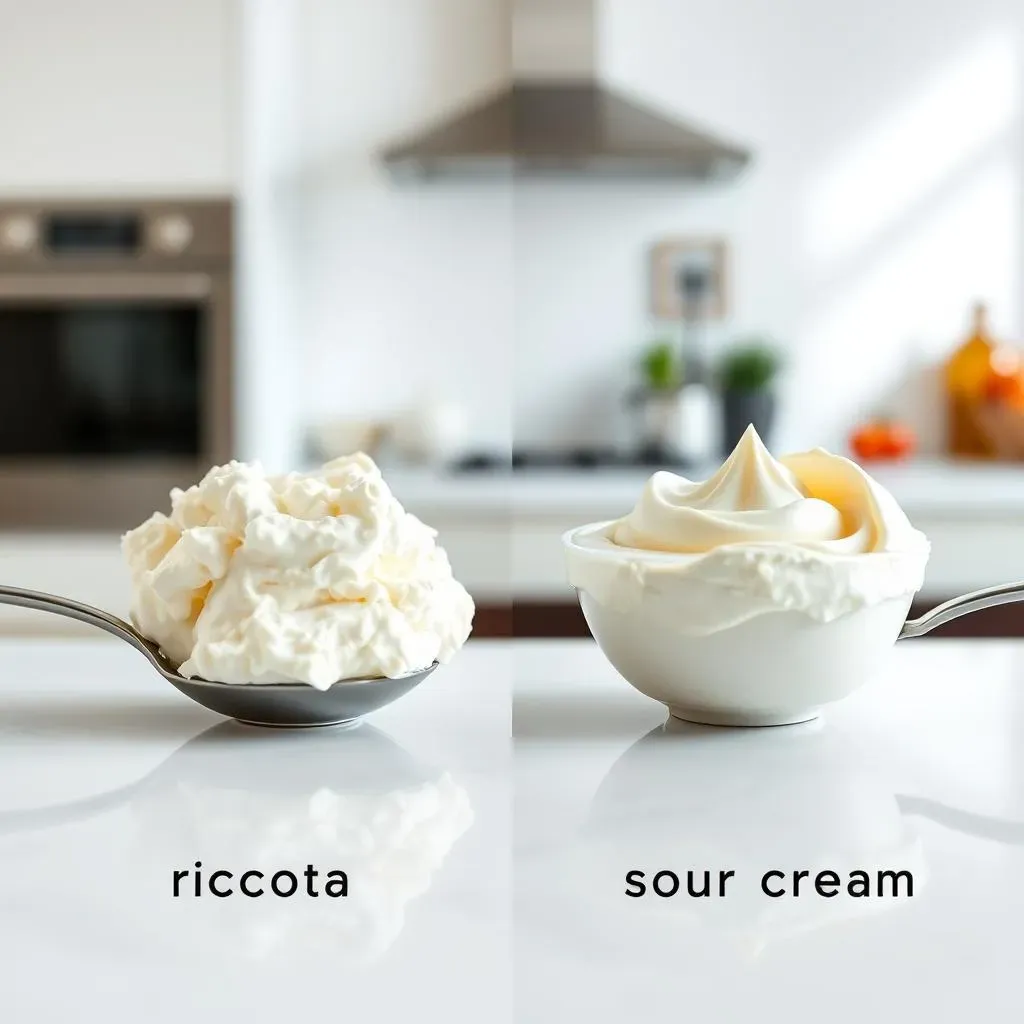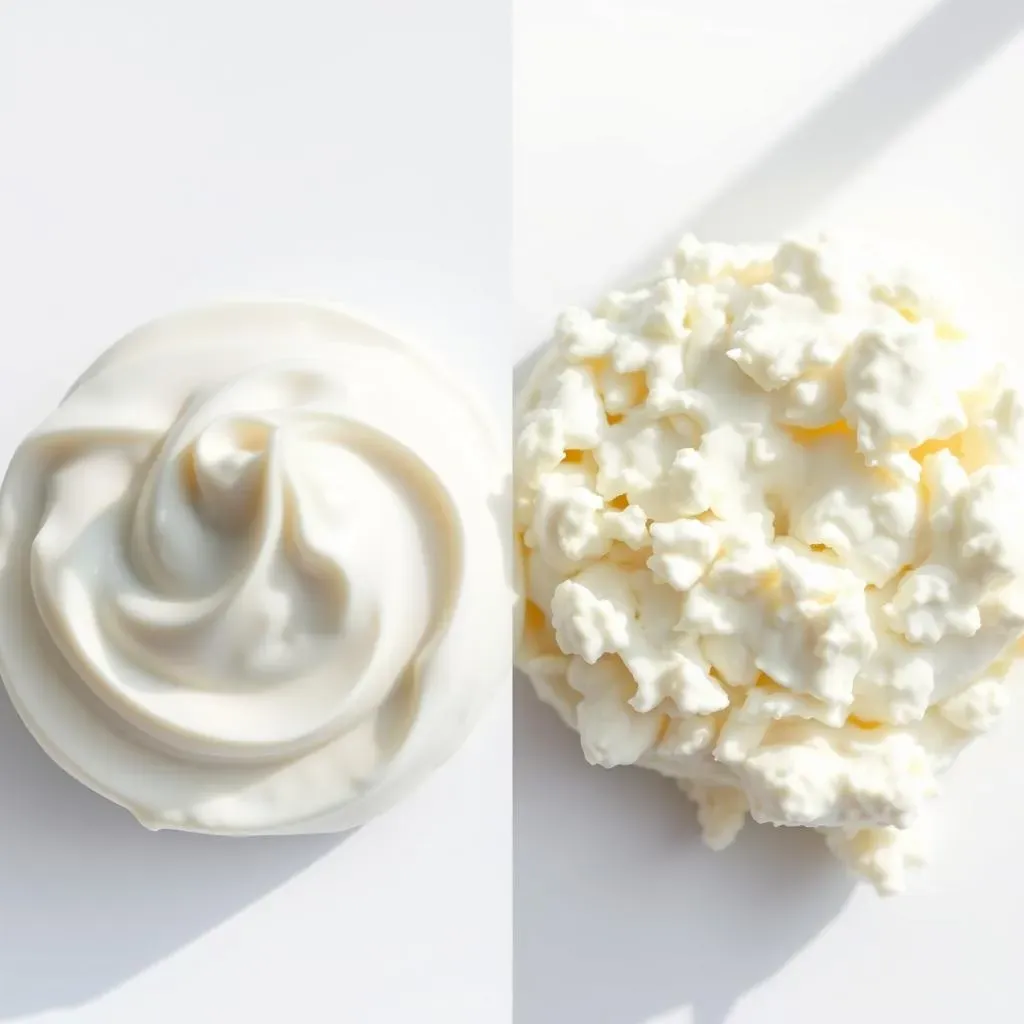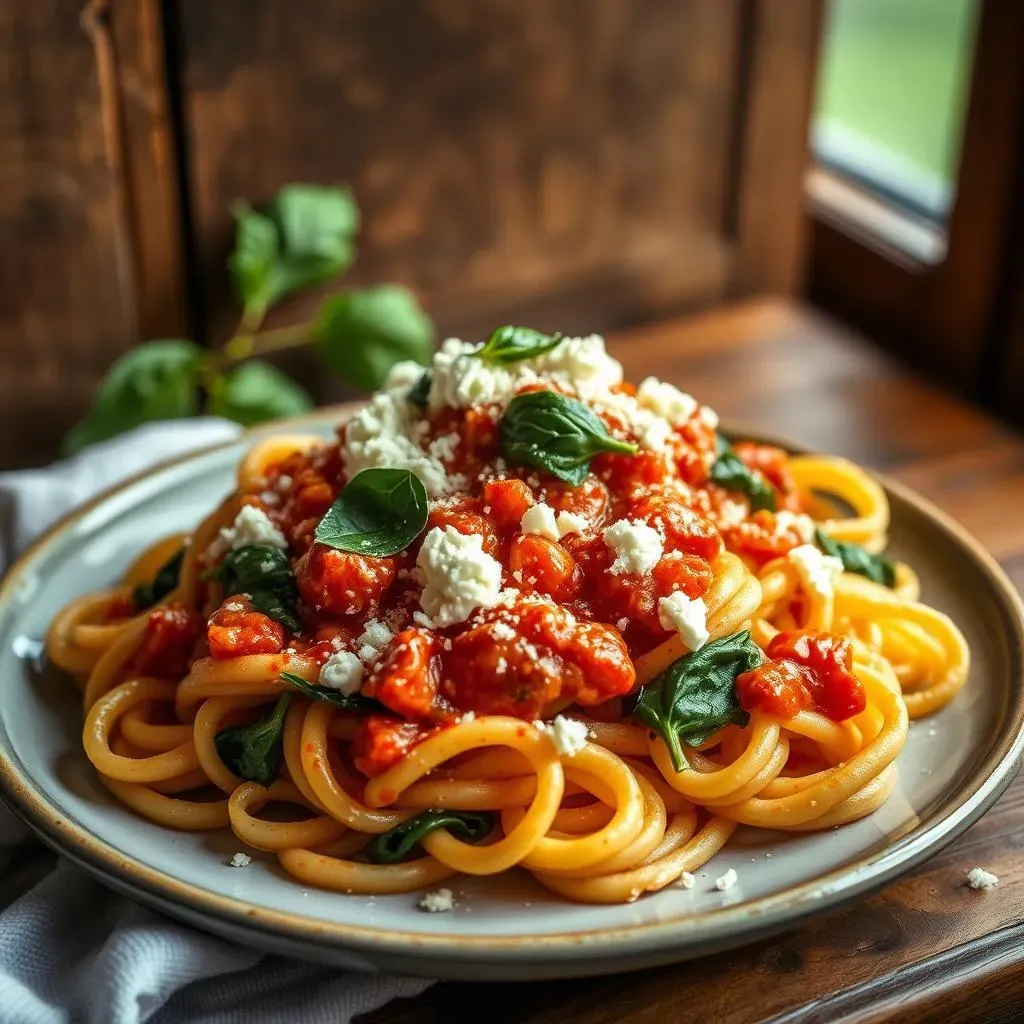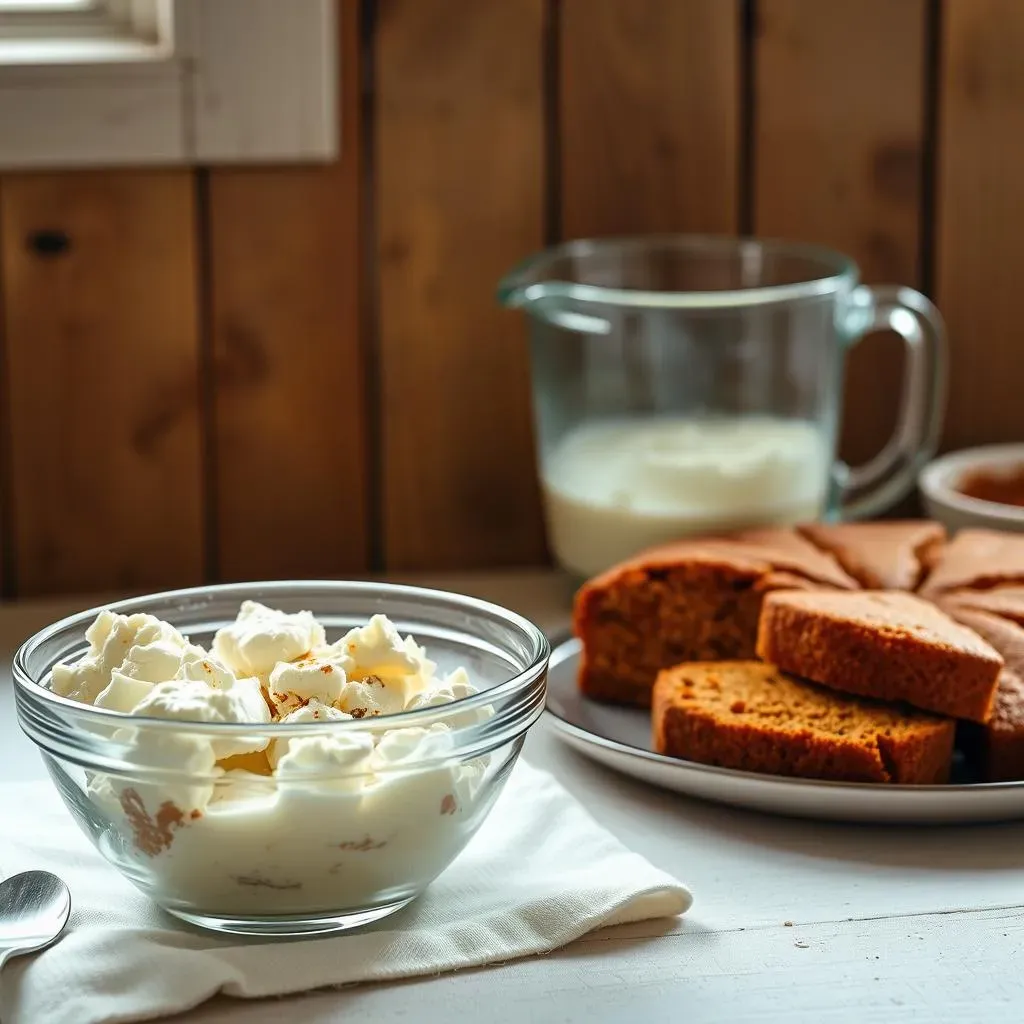Table of Contents
Ever stared into your fridge, recipe in hand, only to discover you're missing a key ingredient? Specifically, sour cream? Don't panic! This article tackles the burning question: can you substitute ricotta cheese for sour cream? We'll explore the creamy conundrum of swapping these two dairy delights, examining their texture and taste differences head-to-head. We'll dive into real-world examples – recipes where this substitution shines, and others where it might fall flat. We’ll also address a common concern: baking! Can you trust ricotta to step in for sour cream in your favorite cakes and other baked goods? Get ready to unlock the secrets of successful ingredient swaps and avoid kitchen disasters. This isn't just about finding a replacement; it's about understanding the nuances of flavor and texture so you can confidently adapt recipes and create delicious results, every time. So, let's explore the world of ricotta and sour cream substitutions and discover if this swap is a culinary win or a kitchen flop!
Can You Substitute Ricotta Cheese for Sour Cream? A Direct Comparison

Can You Substitute Ricotta Cheese for Sour Cream? A Direct Comparison
So, you're wondering if ricotta can stand in for sour cream? It's a common question, and the answer is... it depends! Both are creamy, but that's where the similarities often end. Sour cream boasts a distinctly tangy flavor, thanks to its cultured cream base. Ricotta, on the other hand, is a fresh cheese with a mild, slightly sweet taste. Its texture is also different; ricotta has a slightly grainy consistency, while sour cream is smooth and almost velvety. Thinking about swapping them? Consider the recipe's desired flavor profile and texture. A tangy dip will suffer if you use ricotta, while a creamy pasta sauce might benefit from ricotta's richness. We'll explore specific examples later, but the key takeaway here is to carefully evaluate the role of sour cream in the recipe before making the switch.
Feature | Sour Cream | Ricotta |
|---|---|---|
Flavor | Tangy, slightly acidic | Mild, slightly sweet |
Texture | Smooth, creamy | Slightly grainy, soft |
Fat Content | Varies, often higher | Generally lower |
One thing to keep in mind is the moisture content. Sour cream is quite wet, while ricotta is a bit drier. This difference can significantly affect the outcome of your dish. In recipes where the liquid content is crucial (like a cake), you might need to adjust other ingredients to compensate for the drier ricotta. For instance, you might add a little extra milk or buttermilk to achieve the desired consistency. In other situations, like a creamy sauce, the drier nature of ricotta might actually be beneficial, helping thicken the final product.
- Consider the recipe's overall flavor profile.
- Think about the desired texture – creamy, smooth, or slightly grainy.
- Account for moisture differences and adjust accordingly.
Ricotta vs. Sour Cream: Texture and Taste Differences

Ricotta vs. Sour Cream: Texture and Taste Differences
The Great Taste-Off: Sour Cream vs. Ricotta
Let's talk taste! Sour cream's defining characteristic is its tang. It's that bright, slightly acidic flavor that makes it perfect for dips, toppings, and dressings. Ricotta, on the other hand, is much milder. It's often described as subtly sweet, almost creamy in its flavor profile. Think of it as a blank canvas, ready to absorb other flavors. This difference is crucial when considering a substitution. If the recipe relies on the sour cream's tang for balance, ricotta simply won't deliver the same punch. However, in recipes where the sour cream plays a more supporting role, ricotta's mildness might be a welcome change.
Characteristic | Sour Cream | Ricotta |
|---|---|---|
Primary Flavor | Tangy, Acidic | Mild, Slightly Sweet |
Flavor Intensity | High | Low |
Complementary Flavors | Savory, Spicy | Sweet, Fruity, Herbaceous |
Texture Tales: A Creamy Comparison
Now, let's discuss texture. Sour cream is famously smooth and almost velvety. It's the kind of creaminess that coats your tongue and melts in your mouth. Ricotta, however, has a different personality. It's still creamy, but it has a noticeable graininess to it. This isn't necessarily a bad thing; some people prefer the slightly chunky texture, especially in certain applications. The difference in texture can dramatically impact the final dish. A smooth, creamy frosting simply won't work with ricotta's grainy texture. However, in a pasta sauce or filling, the grainy texture might even add a pleasant contrast.
- Consider the recipe's desired mouthfeel.
- Ricotta's graininess might be a plus in some dishes, but a minus in others.
- Think about how the texture will interact with other ingredients.
Moisture Matters: A Crucial Consideration
Finally, let's not forget about moisture content. Sour cream is a wet ingredient, contributing significantly to the overall moisture of a recipe. Ricotta, while creamy, is comparatively drier. This difference can be a deal-breaker in some recipes. If you replace sour cream with ricotta in a recipe that relies on a high moisture content, like certain cakes or frostings, the final product could be dry and crumbly. To compensate, you might need to add extra liquid, perhaps milk or buttermilk, to restore the balance. However, in recipes where a slightly drier texture is desired, ricotta's lower moisture content might be advantageous.
Recipes Where Ricotta Replaces Sour Cream: Success Stories and Fails

Recipes Where Ricotta Replaces Sour Cream: Success Stories and Fails
Pasta Sauces: A Ricotta Triumph
Let's start with a win! Ricotta often shines in creamy pasta sauces. Its mild flavor doesn't compete with the other ingredients, allowing the herbs, vegetables, and cheese to take center stage. The slightly grainy texture adds a pleasant mouthfeel, contrasting nicely with the smooth pasta. In fact, many Italian recipes traditionally use ricotta in pasta sauces, achieving a rich and satisfying result without the tang of sour cream. Think of a creamy tomato sauce with spinach and ricotta—the ricotta adds a luxurious creaminess that complements the other flavors beautifully.
Recipe | Ricotta Success? | Why? |
|---|---|---|
Creamy Tomato Sauce | Yes | Mild flavor complements other ingredients; texture adds interest. |
Spinach and Ricotta Ravioli Filling | Yes | Classic combination; ricotta provides moisture and creaminess. |
Creamy Mushroom Sauce | Yes | Ricotta's richness enhances the earthy flavors of mushrooms. |
Frosting Flop: Where Ricotta Falls Short
Now, let's talk about a less successful substitution: frosting. Sour cream frosting relies on the smooth, tangy flavor of sour cream for its signature taste and texture. Ricotta's grainy texture and mild flavor simply don't translate well. The result is often a dry, oddly textured frosting that lacks the desired tang. If you're aiming for a classic sour cream frosting, it's best to stick with the original ingredient. There are plenty of other delicious frosting options out there, so don't be afraid to experiment, but for a true sour cream frosting, a substitute simply won't do the trick.
- Cakes and Cupcakes: Ricotta's dryness can make cakes dry and crumbly.
- Frostings: The grainy texture and lack of tang are usually undesirable.
- Cheesecakes: Ricotta is a common ingredient in cheesecakes, but it's not a direct sour cream replacement.
Other Considerations
The success of substituting ricotta for sour cream highly depends on the specific recipe and the role the sour cream plays. Sometimes, a small amount of lemon juice or vinegar can help mimic the tanginess of sour cream when using ricotta as a substitute. Always consider the recipe's overall flavor profile and desired texture before making a swap. Experimentation is key! Start with a small batch to test the waters before committing to a whole recipe. If the result isn't perfect, remember, it's just an opportunity to learn and improve your culinary skills.
Can You Substitute Ricotta Cheese for Sour Cream in Baking? A Baker's Perspective

Can You Substitute Ricotta Cheese for Sour Cream in Baking? A Baker's Perspective
Can You Substitute Ricotta Cheese for Sour Cream in Baking? A Baker's Perspective
Ah, baking—the realm of precise measurements and delicate balances! Substituting ricotta for sour cream in baking is a trickier proposition than in savory dishes. Sour cream contributes both moisture and tang. Ricotta, while creamy, is drier and milder. This means that a direct swap often leads to disappointment. Cakes can turn out dry and crumbly, while frostings might lack the desired tang and creamy texture. The moisture content is crucial; sour cream's high water content helps create a tender crumb in cakes, while ricotta's lower moisture can lead to dryness. The tangy element is also important; sour cream provides a nice counterpoint to sweetness, something ricotta lacks. However, there are some instances where a modified substitution might work. For instance, in recipes where sour cream is used more for richness than tang, a careful substitution might be possible, but it often requires adjustments to other ingredients like adding extra liquid or reducing sugar.
Baking Application | Ricotta Substitution? | Considerations |
|---|---|---|
Cakes | Generally No | Dryness is a major concern; needs significant recipe adjustment. |
Muffins | Possibly, with modifications | May add moisture; adjust other liquids accordingly. |
Frostings | Generally No | Lack of tang and grainy texture are problematic. |
Let's consider the classic sour cream coffee cake. The sour cream provides moisture and a slight tang that balances the sweetness of the cake. Replacing it with ricotta would likely result in a dry, bland cake. However, in a recipe for ricotta cheese pancakes, where the ricotta is already part of the recipe and contributes to the richness, the addition of a small amount of sour cream might enhance the flavor profile. It's all about understanding the role of each ingredient in the recipe.
- Always check the recipe's purpose for the sour cream.
- Consider the moisture content and adjust accordingly.
- Taste as you go and be prepared to make adjustments.